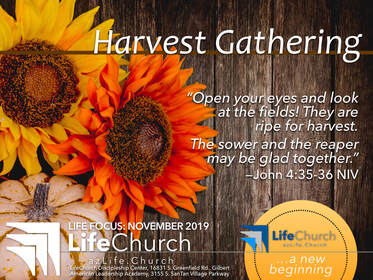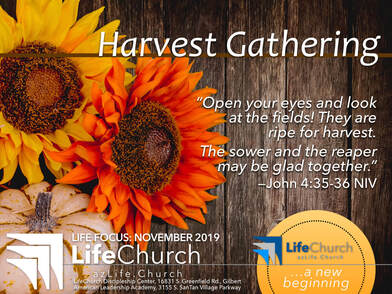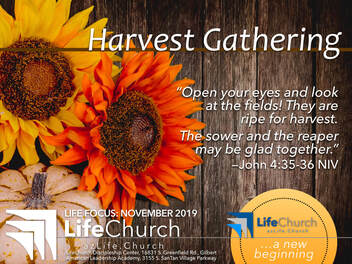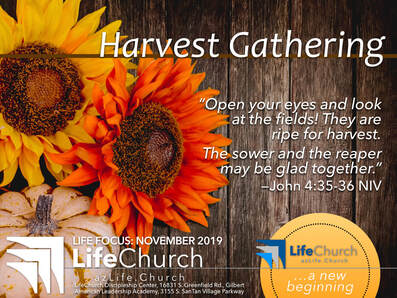AuthorTerry R Baughman is Lead Pastor for LifeChurch in Gilbert, AZ. See his complete bio at trbaughman.com Archives
July 2024
Categories |
Back to Blog
In the Beginning12/1/2019  In the Beginning ADORE HIM! Terry R. Baughman “In the beginning was the Word, and the Word was with God, and the Word was God. … And the Word became flesh and dwelt among us, and we beheld His glory, the glory as of the only begotten of the Father, full of grace and truth” (John 1:1; 14). From Creation to incarnation the story of redemption is revealed. The wonderful narrative of God reveals His eternal goodness and the manifestation of His grace. Both Genesis and John begin with the same phrase, “In the beginning” (Genesis 1:1, John 1:1). Both set the context of their story in the realm of God’s eternal purpose. Nothing else matters before that moment. All that is important to know is just that God is there and that He has a wonderful plan in process. How does your story begin? How should any narrative start? The most obvious answer is, “In the beginning!” So begins the revelation of God’s purpose for Creation and His plan of redemption. Genesis starts with, “In the beginning God created the heavens and the earth” (Genesis 1:1). Before there was humanity, there was Divinity. Before there was a Creation, there was a Creator. Before there was a world spoken into existence, there was a thought in the mind of God of what it would become. Before God made humans in His image, there was the knowledge of humanity’s marred image and the awful effects of their rebellion. Before there was transgression, there was also a plan for atonement. Christ was, “the Lamb slain from the foundation of the world” (Revelation 13:8). In John’s Gospel the story continues, yet he again appeals to the beginning. It was as though we needed to be reminded that there are no mistakes with God. This is not act two of a divine drama. This is not a do over, or version 2.0 with a newly revised program to work out the bugs of the previous plan. John said, “In the beginning was the Word, and the Word was with God, and the Word was God” (John 1:1). It was humanity that needed the do over. It was the people who groped in darkness and stumbled in confusion. “And the light shines in the darkness, and the darkness did not comprehend it” (John 1:5). The prophet Isaiah saw this day when he wrote, “The people who walked in darkness have seen a great light; Those who dwelt in the land of the shadow of death, upon them a light has shined” (Isaiah 9:2). Jesus is the light of the world. He is the One who shines from the beginning to the end. He is, “The Alpha and the Omega, the Beginning and the End, the First and the Last” (Revelation 1:8; 21:6; 22:13), and yet He chose to enter into His Creation as a child to reveal His plan and purpose among the people. That is when, “The Word became flesh and dwelt among us” (John 1:14). Christmas is a reminder of His coming, His humanity, His humility, and His great love. Isaiah declared, “For unto us a Child is born, unto us a Son is given; and the government will be upon His shoulder. And His name will be called Wonderful, Counselor, Mighty God, Everlasting Father, Prince of Peace” (Isaiah 9:6). No wonder they worshipped Him from the moment of His birth. Jesus is worthy of glory, honor, and praise. That is the reason we sing, and clap, and shout with a voice of victory. Our redeemer has come to bring salvation. We have been restored to God through the birth of the promise, the death of the savior, and the resurrection of the eternal King. “O Come let us adore Him! The Savior, Christ, the Lord!” Theme passage: “I am covered by your covenant of mercy and love. So I come to your sanctuary with deepest awe to bow in worship and adore you” (Psalm 5:7 The Passion Translation).
0 Comments
Read More
Back to Blog
Thanks to God11/24/2019  Thanks to God THE FRUIT OF THE HARVEST Terry R. Baughman “Speaking to one another in psalms and hymns and spiritual songs, singing and making melody in your heart to the Lord, giving thanks always for all things to God the Father in the name of our Lord Jesus Christ” (Ephesians 5:19–20). It is not incidental that Thanksgiving comes in the fall of the year and on the cusp of more severe weather. In times when most people were involved in growing their own food they were more aware of the blessing of harvest. This time of year was an occasion to celebrate the success of another season of growth and increase. So many things can happen in the early stages of agriculture during the times of planting, cultivation, and growth. There can be too little rain or too much. There can be random storms and devastating winds. Insects and varmints can invade and destroy a crop in hours that has taken weeks to produce. Even in times of harvest many things can go wrong and cause the loss of a crop or dashed hopes for a successful growth season. However, when the harvest was safely in the barns, grain stored for future planting, and food on the table there was occasion to rejoice. Isaiah spoke of the joy of harvest when he prophesied the coming of the Messiah. “The people who walked in darkness have seen a great light; Those who dwelt in the land of the shadow of death, upon them a light has shined. You have multiplied the nation and increased its joy; They rejoice before You according to the joy of harvest” (Isaiah 9:2-3). When salvation came the was joy likened to the successful harvest. It is a cause for celebration and thanksgiving! While our celebration is unlike those who celebrated the harvest, Thanksgiving is just as meaningful to those who recognize the works of our God. Although the season of Thanksgiving may not be considered a religious holiday one cannot help but reflect on God’s blessings as we consider the many things for which we are grateful. The American tradition of Thanksgiving has become a time for road trips, feasting, football, outdoor sports, and great shopping opportunities. Many look at the holiday as the yearly opportunity to decorate for Christmas, prepare for Black Friday sales event, or to binge eating before they give in to a food-induced coma on the couch. However, the true essence of Thanksgiving is to give glory and honor to God for all of our blessings in life. Others may have a heart of gratitude but unless there is an object of worship our gratitude seems empty and our thanksgiving self-centered. When we are truly grateful we want to express that appreciation to something bigger than we are, to the one who has made it all possible. When we recognize God as our creator, our provider, and the source of every blessing it is only natural that our gratitude be centered on Him. An attribute of the final generation according to the apostle Paul was that they would be unthankful. Of the last days He predicted, “Men will be lovers of themselves, lovers of money, boasters, proud, blasphemers, disobedient to parents, unthankful, unholy, unloving, unforgiving, slanderers, without self-control, brutal, despisers of good, traitors, headstrong, haughty, lovers of pleasure rather than lovers of God, having a form of godliness but denying its power” (2 Timothy 3:2–5). While we may see some if not all of those characteristics in our culture, let us keep the observance of Thanksgiving as a reminder that there is a God over all who is covering us and keeping us in His care. Let this sincerely be a time of thanksgiving to God for all of His incredible blessings. Theme passage: “So shall My word be that goes forth from My mouth; It shall not return to Me void, But it shall accomplish what I please, And it shall prosper in the thing for which I sent it” (Isaiah 55:11).
Back to Blog
Plenty to Share11/17/2019  Plenty to Share THE FRUIT OF THE HARVEST Terry R. Baughman “Let them do good, that they be rich in good works, ready to give, willing to share” (1 Timothy 6:18). The horn of plenty is a well known symbol for Thanksgiving. The variety of fruits and vegetables spilling out of a fluted basket depicts an abundant harvest of plentiful produce to share with others. From the first Thanksgiving when settlers shared the game and harvest with the indigenous people there was a sense of community and reflection as they gathered around and shared their feasts as friends. There is something truly special when we gather around the table to eat with friends or family, and especially during a season of Thanksgiving. Blessings are meant to be shared. The increase we have received from our labors is not solely for us to enjoy but to share with others. That is where true joy comes from. In one of Jesus teaching stories he spoke of a successful landowner who enjoyed a bumper crop. However, the foolish man chose to build bigger and greater storehouses to contain his blessings for himself saying, “Soul, you have many goods laid up for many years; take your ease; eat, drink, and be merry” (Luke 12:18). What the man did not know was that death was imminent and all his blessings would be left behind for others to take. The indication of the story was that a wise man would share from his abundance knowing that we are in certain of the length of our life and we would never regret sharing our blessings and enjoying our success with others. Whether it is natural growth, financial increase, or spiritual blessings, all things are given to us for responsible stewardship and the opportunity to share. Jesus instructed his followers, “Heal the sick, cleanse the lepers, raise the dead, cast out demons. Freely you have received, freely give” (Matthew 10:8). Jesus taught much about giving and stewardship. He said, “Give, and it will be given to you: good measure, pressed down, shaken together, and running over will be put into your bosom. For with the same measure that you use, it will be measured back to you” (Luke 6:38). In the same measure we share with others we will be rewarded. If we use a thimble when sharing with others, that is how much we can expect in return. However, if we use a barrel to share our blessings, we will be blessed with barrels full. The Lord challenged the people through the prophet to put God to the test. He said, “Try Me now in this,” and see, “If I will not open for you the windows of heaven and pour out for you such blessing that there will not be room enough to receive it” (Malachi 3:10). We should not hesitate to distribute to the needs of others. For the promise of return is seen throughout the Scripture. The preacher said, “Cast your bread upon the waters, for you will find it after many days” (Ecclesiastes 11:1). Though the blessings may not come in the same fashion as we give them, in unseen ways and many days the reward will be seen. Sharing affects our worship and the sacrifice of praise bring pleasure to God. The Word said, “Therefore by Him let us continually offer the sacrifice of praise to God, that is, the fruit of our lips, giving thanks to His name. But do not forget to do good and to share, for with such sacrifices God is well pleased” (Hebrews 13:15–16). We have been given plenty; now let us share! Theme passage: “So shall My word be that goes forth from My mouth; It shall not return to Me void, But it shall accomplish what I please, And it shall prosper in the thing for which I sent it” (Isaiah 55:11).
Back to Blog
Seed to Sow11/10/2019  Seed to Sow THE FRUIT OF THE HARVEST Terry R. Baughman “The kingdom of God is as if a man should scatter seed on the ground, …, and the seed should sprout and grow, he himself does not know how. For the earth yields crops by itself: first the blade, then the head, after that the full grain in the head. But when the grain ripens, immediately he puts in the sickle, because the harvest has come” (Mark 4:26–29). The power is within the fruit of the harvest to reproduce a bountiful return. It is not only a consumable product, but it is also sustainable. There is sufficient increase in nature to provide for food and such an abundance to also lay aside a portion for the next harvest. Every farming family understands the importance of producing enough to provide food for the family, enough to sell or barter to provide for more immediate needs, and enough to lay in store to provide for the next planting season insuring a future harvest that will continue to sustain their livelihood. We hear a lot about sustainability in current events. Sometimes it is reduced to media shaming for simply living in a consumer centric culture. We have enjoyed such abundance and prosperity in the west that we lose sight of the source of some of the things that we enjoy. Profit driven entrepreneurs are more inspired by the current bottomline of their business, rather than concern themselves whether there will be enough raw materials to sustain their growth and longevity. The further removed we are from the facts of farming the more difficult it is to understand the economics of sustainability. In the past when everyone was nearer to the process of planting, growth cycles, harvesting, and laying aside seed for future planting there was an awareness of the simple science of sustainability. If there is no seed reserved to plant in the future field, there will be no future harvest. Saving seed alone is not enough, but it must be reinvested into the ground in the favorable season so that it may die, and sprout, and grow into another harvest. Saving the seed is insufficient to guarantee abundance for the future. The purpose of the seed is not simply to be saved in the storehouse, but to be invested in the field when the season of planting has arrived. It is possible that we have become more obsessed with saving the seed than expanding the fields and increasing tomorrow’s yield. We cannot simply repeat our ritualistic performance as a religious routine; we must dilate our vision to see opportunities, broaden our outreach in casting the seed, and eagerly, “look on the fields” in anticipation of a bountiful harvest. Jesus spoke of His burial and resurrection with the illustration of a seed dying in the ground. He said, “Unless a grain of wheat falls into the ground and dies, it remains alone; but if it dies, it produces much grain” (John 12:24). This is also a principle of harvest. When we sow the seed, we give up the control of the portion we have planted. It is buried, covered in dirt, out of sight. We must have faith in the process, faith in the power of the seed, and trust in the participation of God for the growth beyond our efforts and control. We plant and water, but God alone gives power to the seed to germinate into a plant of new growth. The results of the harvest are out of our hands when we yield the seed into God’s hands. The harvest is assured. God is faithful. Invest with confidence trusting in the Lord of the Harvest. Simply sow the seed. Theme passage: “So shall My word be that goes forth from My mouth; It shall not return to Me void, But it shall accomplish what I please, And it shall prosper in the thing for which I sent it” (Isaiah 55:11).
Back to Blog
Food to Eat11/3/2019  Food to Eat THE FRUIT OF THE HARVEST Terry R. Baughman “Who plants a vineyard and does not eat of its fruit? Or who tends a flock and does not drink of the milk of the flock?” (1 Corinthians 9:7). God provided an abundance in His creation. Vegetation abounds through out the flora. Grain is harvested for bread, meal, and a wide variety of food products. Rice is plentiful in many areas of the world and provides a staple for meals in some of the most impoverished regions of the globe. A large variety of fruit is plentiful with a diversity of trees and vines. Vegetables grow in abundance where the weather is suitable and the produce is harvested and shipped to distant places. A visit to the local produce market will reveal the production of farms from many locations. It is no wonder that the horn of plenty is often used as a symbol of thanksgiving and the season of harvest. The fruit of the harvest provides food to eat. It is what sustains life and provides vital nutrients to the wellbeing of humanity. Those who labor in the production of food enjoy the fruit of their labor and then sell or trade from the abundance to provide for all their needs. Fruitfulness is so common in agriculture that no wonder Jesus had harsh words for the fig tree that was barren. In all of nature, fruitfulness is expected. A harvest comes every season and the tree or vine’s purpose is to produce fruit. The fruitless tree dried up and died after the Lord spoke against it. His Word has power to bring life and His curse results in death. Jesus came to speak life and fruitfulness in our lives. Not only do we live by the fruitfulness of a natural harvest, we also find spiritual sustenance in the power of His voice speaking life. Isaiah declared the Word of the Lord, “For as the heavens are higher than the earth, so are My ways higher than your ways, and My thoughts than your thoughts. For as the rain comes down, and the snow from heaven, and do not return there, but water the earth, and make it bring forth and bud, that it may give seed to the sower and bread to the eater, so shall My word be that goes forth from My mouth; It shall not return to Me void, But it shall accomplish what I please, And it shall prosper in the thing for which I sent it” (Isaiah 55:9–11). The Word goes forth with power just like the inherent power of the biosphere. As much as the world exists in the beautiful balance of nature providing all living things with such extravagance, so also God will provide for every spiritual need and blessing to all those who look to Him. Another prophet predicted a famine on the land. He indicated that there would come a time of famine, however, it would not be a lack of food or drink, but for hearing of the Word of the Lord. The Lord said, “I will send a famine on the land, not a famine of bread, nor a thirst for water, but of hearing the words of the Lord” (Amos 8:11). May we be attentive to the Word of the Lord and ready to receive His food to eat. It is powerful, enduring, and full of promise. Prosper in its provision and grow in its truth. Jesus said, “I am the bread of life. He who comes to Me shall never hunger, and he who believes in Me shall never thirst” (John 6:35). Theme passage: “So shall My word be that goes forth from My mouth; It shall not return to Me void, But it shall accomplish what I please, And it shall prosper in the thing for which I sent it” (Isaiah 55:11). |


 RSS Feed
RSS Feed